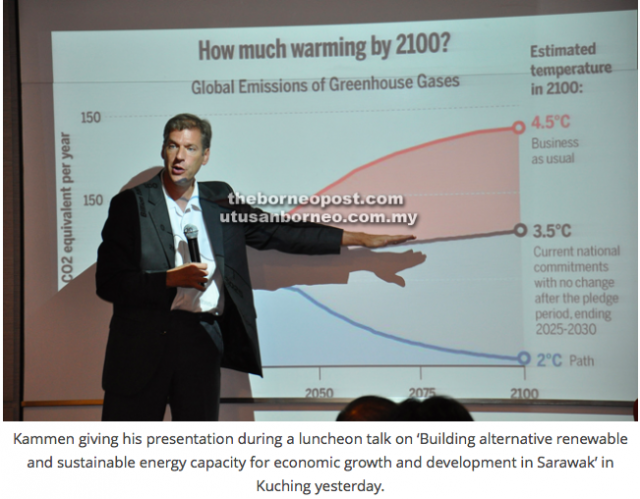NEWS The Borneo Post: Sarawak Chief Minister Adenan gets praise from professor Kammen
The Borneo Post, August 17: KUCHING: Chief Minister Datuk Patinggi Tan Sri Adenan Satem’s move to cancel the plans to construct Baram dam has earned himself compliments from Dr Daniel M Kammen, a distinguished professor of renewable energy at the University of California, Berkeley.
Speaking on the sidelines of a luncheon talk on ‘Building alternative renewable and sustainable energy capacity for economic growth and development in Sarawak’ hosted by Batu Lintang assemblyman See Chee How here yesterday, Kammen regarded the step taken by Adenan as ‘a rare thing’ that had only been taken by only a handful of brave world leaders.
“The Chief Minister of Sarawak has taken a huge and important step cancelling the contract for a mega dam because it wasn’t likely to produce the rural energy that was needed, it wasn’t bringing international financing and instead to invest in a sustainable Sarawak.
“That is a rare thing. I only know a few global leaders who have been that brave, Jerry Brown the governor of California, the chief minister of Sarawak. There are also a few leaders like German Chancellor Angela Merkel who I think have taken a major step to make clean energy the standard.”
Kammen, who is the founding director of the Renewable and Appropriate Energy Laboratory (RAEL), acknowledged that while cancelling the contract for the construction of the big dam was important, the state had to pursue other clean energy such as solar and biomass.
“Of course, I would like to see a little more change because if you’re not going to build the next big dam, but you’re building all those new industrial buildings all around town not equipping them with solar, which I feel is a loss of opportunity.
“Find a few of these new investments like many of the communities around here where they are building lots of new development and tell them ‘your building contract, we’ll grant it but we want to see solar on roof top, we want to see biomass combustion system out back. You’re generating clean energy and we’ll make sure you get paid for it’.”
As part of the measures to encourage the use of renewable and sustainable energy, he opined that the government should strengthen the feed-in tariff mechanism that existed on paper but not used in the country, adding that the businesses or firms wanting to sell back power to the grid should be given the right to do so.
“You can’t just say it and walk away. You have to fund some small companies to start to prove it happens and that requires hard work and that’s the next step. So we have to see it take place, not just to say we have it.
“I know there are many countries that have very good policies on paper but you have to follow it up. Because biomass is so plentiful here coupled with the solar resources that are so good and the micro-hydro, you have to make it happen.”
He said often when people hear about projects to build solar panels and wind turbines, they resisted because it was something that they were unfamiliar with and concerned over the cost, without realising how cheap things had become over the years.
“There is now international financing available (for these projects) from many different agencies, not just the World Bank, the US but new Green
Climate Fund is ramping up right now so that it can spend US$100 billion a year on projects. This is a much broader fund, it supports clean energy projects worldwide.”
Kammen, who last visited Sarawak in June last year and had paid a courtesy call on Adenan, said he was interested to work with Sarawak Energy Bhd and the state government on the analysis needed to put together a clean energy plan.
On Sarawak Corridor of Renewable Energy (SCORE), Kammen opined that it was not a good project as it required the construction of 10 mega dams in n the state, which to him, did not make sense.
“The forests are not only critical for nature but many people make their living off them. Sarawak doesn’t have a deficit of energy, there is actually a lot generated.
“The challenge is that we have to convert that to clean energy. So you need to develop roof top solar, large scale solar. In Peninsular Malaysia, they have large solar projects just near the airport. They are generating solar power, putting it back into the grid. Projects like that need to happen here.”
Dr. Rebekah Shirley directs RAEL’s projects for sustainable energy in Borneo

You must be logged in to post a comment.